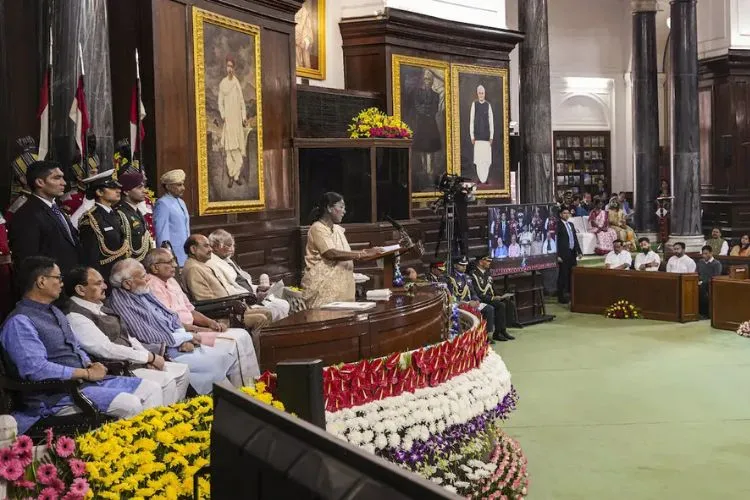
New Delhi
President Droupadi Murmu on Wednesday underlined that the Constitution forms the core of India’s national identity and serves as the charter that steers the country away from colonial thinking towards a nationalist approach.
Speaking at the Constitution Day celebration held in the Central Hall of the old Parliament building, Murmu said that the Indian Parliament, representing the aspirations of citizens in the world’s largest democracy, has emerged as a model that inspires many nations.
Calling the Constitution a symbol of national pride, she said it plays a crucial role in guiding India’s progress with a renewed mindset. In this spirit, she noted, the government has introduced major reforms in the criminal justice system that reflect justice rather than retribution.
Murmu referred to the implementation of three new laws, the Bharatiya Nyaya Sanhita, Bharatiya Nagarik Suraksha Sanhita and Bharatiya Sakshya Adhiniyam, which replaced the colonial-era Indian Penal Code, Code of Criminal Procedure and Indian Evidence Act. These laws came into force on July 1, 2024.
The President emphasised that India’s parliamentary democracy has grown stronger over the decades, earning praise globally for its faith in universal adult franchise. She noted that the executive, legislature and judiciary have together contributed to the nation’s development and ensured stability in citizens’ lives.
Parliamentarians, she said, have carried forward a tradition of deep political engagement and debate, and future global studies comparing democracies would regard India’s system and Constitution with high regard.
Expressing confidence in the country’s democratic institutions, Murmu said Parliament will continue to play a pivotal role in realising the aspiration of making India a developed nation. She added that the arguments made in the Constituent Assembly while adopting the parliamentary model remain relevant to this day.
The President also highlighted the growing participation of women in elections, calling it a powerful expression of democratic awareness. She credited women, youth, farmers, the poor, Scheduled Castes and Scheduled Tribes, and other marginalised groups for strengthening democracy from the grassroots to the national level.
Murmu reiterated that the essence of the Constitution lies in its ideals of social, economic and political justice, as well as liberty, equality and fraternity, ideals that lawmakers have consistently strived to uphold.
Pointing to India’s rapid economic growth, she said the country is on track to become the world’s third-largest economy and has recorded one of the biggest achievements globally in terms of economic justice, with nearly 250 million people rising out of poverty.
During the event, the President launched a digital version of the Constitution in nine Indian languages, Malayalam, Marathi, Nepali, Punjabi, Bodo, Kashmiri, Telugu, Odia and Assamese, and led the reading of the Preamble. A commemorative booklet showcasing calligraphy from the original Constitution was also released.
ALSO READ: Tazaiyun Oomer's vision changed the lives of disabled and empowered Muslim women
Vice-President C.P. Radhakrishnan, Prime Minister Narendra Modi, Lok Sabha Speaker Om Birla, Opposition leaders Mallikarjun Kharge and Rahul Gandhi, several Union ministers and MPs were among those present.
